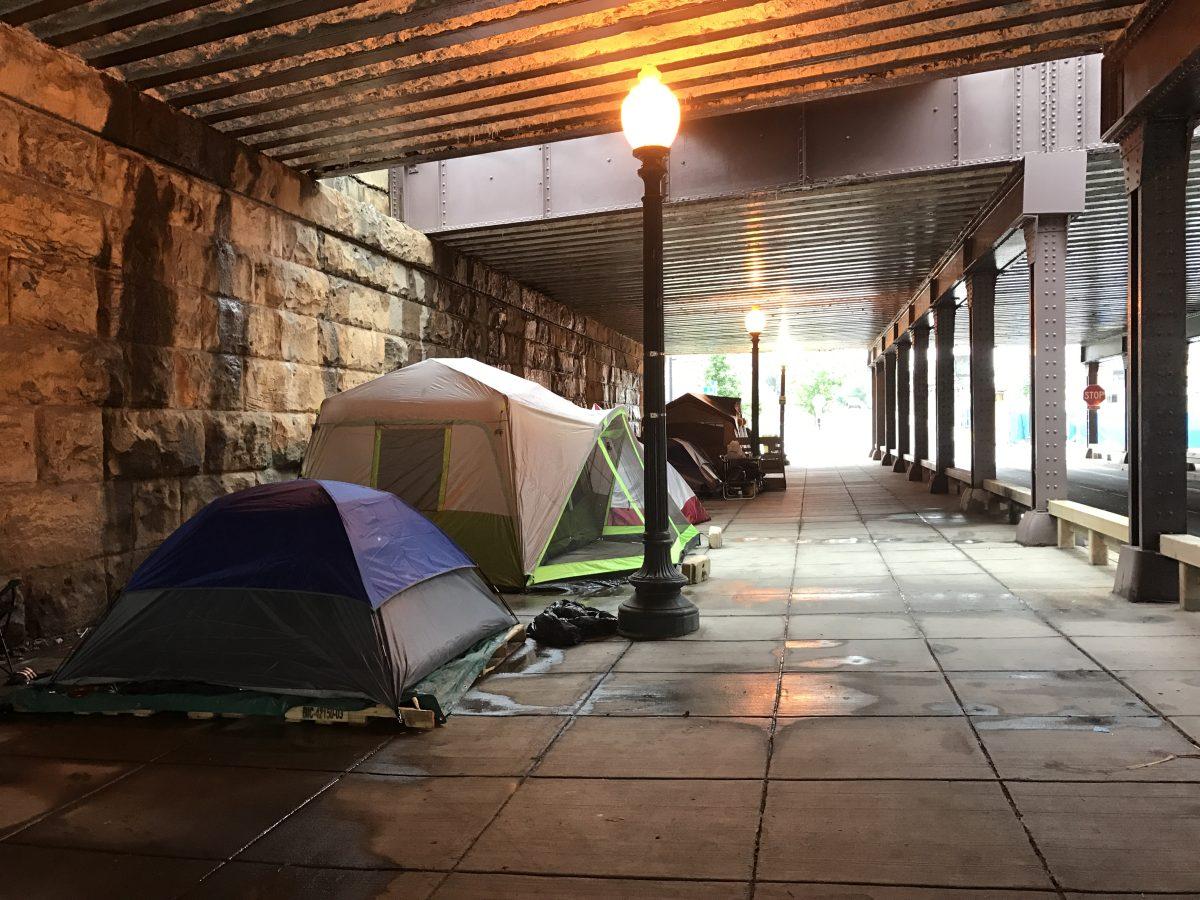Averting my eyes, locking my doors or picking up the pace has always seemed like the easiest and most comfortable thing to do when I witnessed homelessness. When poverty was strikingly visible, offered up on a heaping platter before my eyes, I tried my best not to look.
Many times, I have rectified my behavior by claiming that I do not know where the money is going. Not wanting to support a serious drug addiction, I responded that I did not have any cash on me, not bothering to even ask myself if I did indeed have some leftover cash in my wallet. It was an initial, automatic response.
I changed my behavior by being around better people than myself who did stop; they took the several moments to help someone that I was unwilling to take. Perhaps you are like I was, not stopping to talk to a person on the streets who is in a desperate situation and rectifying your lack of action to yourself. After all, the story of the Good Samaritan doesn’t apply anymore, right?
In case you haven’t read the story, several travelers pass by a man who was just robbed and severely beaten. They make excuses to continue on their way, such as being late to work, not wanting to get dirty and thinking that someone else would come along and help.
If we continue to ignore, marginalize and encourage the criminalization of the most desperate individuals in our society, we are contributing to the problem. It seems ironic to me that I am in our nation’s capital witnessing severe homelessness, but then again, I have seen it in every city. In Raleigh, individuals experiencing homelessness are downtown, a few blocks from the State Capitol or sitting outside coffee shops on Hillsborough Street.
The first step of changing my behavior toward homelessness was realizing that I am exceedingly privileged mentally, physically and financially. Not everyone who is homeless is able to work, has family willing to support them, can secure transportation to a job, is able to go to a shelter, is free from addiction, has access to medication and the circumstances go on and on.
There are countless statistics that support a correlation between mental illness and homelessness, pointing to an area of privilege that many of us take for granted. According to a report from the National Coalition for the Homeless, 20-25 percent of the homeless population in the U.S. suffers from some form of severe mental illness. The most vulnerable of our society, children, are also not exempt from homelessness. In North Carolina, 26,000 to 27,000 students are identified as homeless annually. Legally, these are students who lack a fixed, regular and adequate nighttime residence.
The Raleigh/Wake Partnership to End and Prevent Homelessness completed an annual Point-In-Time Count on a single night in January 2017 and found that 884 individuals in Wake County were either unsheltered, in emergency shelter, or in transitional housing. This survey did not include people living with friends or paying for a motel room.
There are shelters and resources available to these individuals in Raleigh and Wake County, but what I want you to consider is how you can be a resource as well. I had no idea that stopping for a few minutes, even seconds, could make an impact on someone, but it can. When I consider how many unnecessary items I buy with my money, I no longer feel like I have an excuse. Don’t carry cash? No problem — buy them a meal, and even better, sit down and share food with your fellow mankind.
I have learned so much from people who are just like me but are down on their luck and feel completely marginalized from society. Imagine feeling like you have no friends or family, no one who cares if you are alive or not (some people do not just feel like that, but are literally in that situation). Now imagine being the one person all day who stopped to say “How’s it going?” and really listened. Imagine giving someone the only meal they will have that day.
For some, especially women, safety may be a prominent concern in interacting with others. I am not suggesting that you jeopardize your own safety, but having breakfast with someone in a public place or bringing someone a meal before you carry on is an easy way to help someone (and possibly learn a thing or two).
It may be sadly more reassuring, and certainly eye-opening, to know that it is homeless people who should be afraid of violence against them; a survey of 250 homeless individuals in South Florida in 2013 found that four in 10 women and three in 10 men had been victims of violent attacks since living on the streets. The bottom line is that people should not be criminalized for sharing a public space or going through a rough time in their lives, something that I myself am guilty of doing.
While oftentimes I see homeless people being shooed away by business owners or passed by without a glance, I cannot help but to think about the cyclical pattern of destruction this behavior enforces. Even worse, homeless individuals are arrested by laws purposefully sought to target people on the streets. Instead of helping them, we as a society are pushing them down.
A 2015 report published by the Seattle University School of Law found that since 2000, Washington communities have enacted laws that create over 288 ways to punish people in poverty utilizing public spaces. There has been no compiled report on laws in North Carolina, but one such instance of what absolutely goes on is when a charitable organization was threatened with arrest in 2013 for feeding homeless people in Raleigh’s Moore Square.
This problem cannot be solved with passivity; rather, we must all make the effort to raise the quality of living for those in our community. I cannot offer a perfect solution or pretend that giving away all of your money is in your best interest, but by consciously recognizing your own privilege and allowing it to humble you, offering genuine care and interest, and working to listen to and amplify the struggles of the homeless community, just maybe the problem can start to be confronted.
Some awesome organizations to know about in Raleigh or volunteer with are the Raleigh/Wake Partnership to End and Prevent Homelessness, Raleigh Rescue Mission, the Wrenn House and the Durham Rescue Mission Shelter for Women. For more details and more organizations to know about, visit the Homeless Shelter Directory for the Raleigh Area.















